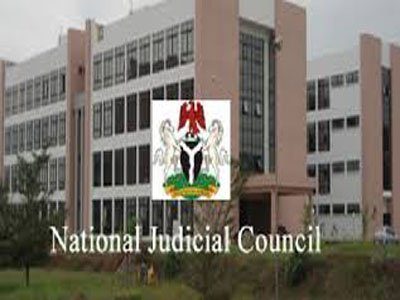Bank reports judge to NJC, EFCC over ‘questionable’ judgment
•Deputy Chief Registrar: ‘I’m yet to receive petition’
Union Bank of Nigeria Plc has accused Justice Ibrahim Buba of the Federal High Court of perverting the cause of justice in a suit filed against it by an alleged debtor.
It petitioned the National Judicial Council (NJC), the Economic and Financial Crimes Commission (EFCC), and the Department of State Security (DSS), alleging professional misconduct.
But the court’s Deputy Chief Registrar Mr Bello Okandeji, told The Nation that was yet to get a copy of the petition to be able to react. He promised to “find out”.
The bank said the judge “turned the law upside down” in a judgment in the debtor’s favour.
Union Bank said the judgment “appears most unreasonable and difficult to understand, thereby conferring benefit to the unrighteous at the expense of the righteous…”
The petitioner claimed that the judge by the judgment, exposed it to a great risk, as the loan facilities extended to the company was part of its depositors’ and shareholders’ funds.
It urged the NJC and anti-graft agency to intervene, saying it cannot afford to lose such huge amount of money.
The bank said it granted a loan facility amounting to the sum of $68millionto to a property company, whose alter ego is an Indian national, for the building of a commercial property in Abuja, which is said to have been completed.
“The loan remains unserviced with an outstanding balance currently standing at the sum of $81,941,230.84 as at February 7, 2018,” the bank said in a statement.
Union Bank said the debtor had at the time of obtaining the loan provided two legal mortgages as collateral. The facility, according to the bank, had a four-year tenor and was meant to expire on April 30, 2015.
According to the petitioner, the loan was disbursed in dollars and the interest was initially fixed at 15 per cent per annum, with payment to be done through proceeds from the Abuja property, from the rental proceeds of properties in Lagos and Abuja, and from the company’s other businesses.
The bank said the loan was restructured, but the company allegedly persisted in its default to repay the loan.
“At one instance, in a letter dated June 28, 2016 the defaulting company acknowledged its indebtedness to the bank by admitting owing $61.089million and was proposing repayment pattern of N250 million and N388,890 million in five installments. But the loan increased to $81.941,230.80 due to lack of servicing,” the bank said.
Union Bank said the debtor filed a suit against it at the Federal High Court in Lagos, seeking 12 reliefs, including “a total reversal of the obligation of the defaulting customer”.
The bank accused Justice Buba of making “contrasting findings by declaring the loan facility illegal, voiding the legal instrument/agreement of the loan and granting an order of perpetual injunction to restrain the bank from exercising its right to appoint a receiver even when the court also held that the amount owed to the bank must be paid…”
“By so doing, Honourable Justice Buba somersaulted severally in the judgment,” the bank said.
According to the bank, the judge also made “an order of perpetual injunction restraining the defendant (Union Bank) or its agents from enforcing the loan agreement executed by the plaintiff,” among others.
The petitioner claimed that the judge was unable to balance the interest of both parties because the risk assets that would have been used to recover the loan was “fully destroyed” by the judgment.
The bank also accused the judge of failing to release the judgment until March 22 this year, 22 days from the date he delivered the judgment, which Union Bank said was in violation of Section 294(1) of the 1999 Constitution.
This, the bank said, affected the perfection of its appeal at the Court of Appeal.
The petitioner said the judge made another order that parties should maintain status quo “without giving the defendant enough opportunity to even appear in court or be represented by counsel”.
The bank faulted the judge in holding that the contract of credit facilities in foreign denominated currency between the bank and the company was illegal.
It said the judge “somersaulted in law when he held that the outstanding indebtedness of the company be converted to naira at the prevailing exchange rate of N158 to a dollar being the prevailing rate at the time the credit facility was availed to the company in March, 2011.”
The bank added that the judge allegedly misinterpreted the law by holding that the bank’s granting of credit facilities in US Dollars and demanding it is prohibited under the Central Bank of Nigeria (CBN) Act.
The judge was also accused of holding that an upward review of interest rate did not form part of the agreement between the parties to the loan.
The bank said it referred to the agreement via a letter dated June 28, 2016 where the company admitted that payment should be in dollars, and despite not being controverted, the judge allegedly did not take it to account.
The Deputy Chief Registrar, when asked if the court would react to the petition, said: “With respect to the said petition, I am yet to get a copy. I will find out tomorrow (today) please. You may also wish to see me in the office tomorrow.”


